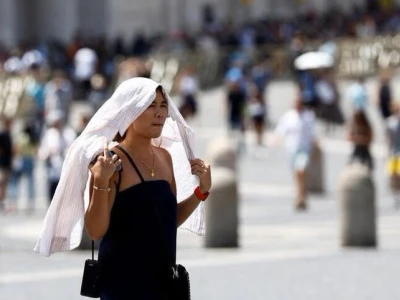
Heatwaves: world reels from wildfires, floods as US and China discuss climate crisis
"It is toxic for both Chinese and for Americans and for people in every country on the planet."
NEW YORK, July 17 (Reuters) - Asia, Europe and much of the United States baked under extreme heat on Monday as global temperatures soared toward alarming highs and U.S. leaders sought to reignite climate diplomacy with China.
The U.S. was scorched by record-setting heat in the West and South, lashed with flood-triggering rain in the Northeast, and choked by wildfire smoke in the Midwest.
A heat dome parked over the western U.S. pushed the temperature in California's Death Valley desert to 128 Fahrenheit (53 Celsius) on Sunday, and kept daily highs in Phoenix on track to exceed 110 degrees F (43 C) through the week. That would break a previous streak of 18 straight days above 110, according to forecasters.
Even as nearly a quarter of the US population fell under extreme heat advisories, heavy rains devastated the state of Vermont and parts of Pennsylvania, where flash floods killed five people and swept cars away over the weekend.
Meanwhile, smoke from Canadian wildfires wafted over the Great Lakes, High Plains and other parts of the Midwest, prompting air quality alerts and keeping the elderly and other vulnerable people indoors.
With scientists saying the target of keeping global warming within 1.5 degrees Celsius of pre-industrial levels is moving beyond reach, evidence of the crisis was apparent across the world.
A remote town in China's arid northwest, Sanbao, registered a national record of 52.2 Celsius (126 Fahrenheit). Wildfires in Europe raged ahead of a second heat wave in two weeks that was set to send temperatures as high as 48C.
Italy's health ministry on Monday issued red weather alerts - signaling a possible health threat for anyone exposed to the heat - for 20 of the country's 27 main cities on Tuesday, with the number expected to rise to 23 on Wednesday.
France's public health agency said the current stretch of hot weather would probably hospitalize or kill "many" people, as heat waves have done almost every summer since 2015. The World Meteorological Organization said the extreme heat and rainfall was expected to extend into August.
"In many parts of the world, today is predicted to be the hottest day on record," tweeted Tedros Adhanom Ghebreyesus, director-general of the World Health Organisation.
"The #ClimateCrisis is not a warning. It’s happening. I urge world leaders to ACT now."
In a resumption of diplomacy on global warming between the two superpowers, U.S. climate envoy John Kerry met Chinese counterpart Xie Zhenhua in Beijing, urging joint action to cut methane emissions and coal-fired power.
"In the next three days, we hope we can begin taking some big steps that will send a signal to the world about the serious purpose of China and the United States to address a common risk, threat, challenge to all of humanity created by humans themselves," Kerry said, noting the proliferation of storms and fires.
"It is toxic for both Chinese and for Americans and for people in every country on the planet."
Prolonged high temperatures in China are threatening power grids and crops and raising concerns about a repeat of last year's drought, the most severe in 60 years.
Typhoon Talim was gaining strength and due to make land at night along China's southern coast, forcing the cancellation of flights and trains in the regions of Guangdong and Hainan.
In South Korea, torrential rains left 40 people dead as river levees collapsed causing flash floods. They followed the heaviest recorded rain in the capital Seoul last year.
'VERY SCARY'
The high temperatures are especially risky for people like teenage sisters Matilde and Angelica Aureli from Rome, who during extreme heat can only venture outside after 9 p.m. because they are albinos.
"In the summer, it is getting hotter year by year... it's actually very scary as an experience because for people with albinism, the sun keeps getting worse," Matilde said.
Tourists in the Italian capital cooled themselves under giant fans set up outside the Colosseum and took turns to drink from a fountain near the Spanish Steps.
In Spain, temperatures could rise as high as 44C in some regions. A forest fire on the island of La Palma in the Canaries that forced the evacuation of 4,000 people was being brought under control as temperatures fell, local official Sergio Rodriguez said in an interview on TVE.
Scientists have long warned that climate change, caused by CO2 emissions from burning fossil fuels, will make heatwaves more frequent, severe and deadly.
The European Union's Copernicus Climate Change Service says 2022 and 2021 were the continent's hottest summers on record.
Buildings and roads are storing heat during the day and releasing it at night, causing temperatures to remain up to 4C higher than in surrounding areas and contributing to health risks for vulnerable people, said Andreas Flouris, associate professor of physiology at Greece's University of Thessaly.
"We've seen that this night-time temperature increase in cities often contributes a lot more than we thought to mortality," Flouris said.
UNCHARTERED TERRITORY
As many as 61,000 people may have died in Europe during heatwaves last summer, with a repetition feared this season.
"My worry is really health - the health of vulnerable people who live just below the rooftops of houses which are not prepared for such high temperatures," said Robert Vautard, a climate scientist and director of France's Pierre-Simon Laplace Institute. "That could create a lot of deaths."
In Cyprus, a 90-year-old man died and three people were in hospital with heat stroke symptoms as temperatures spiked at over 45C on Saturday, authorities said.




